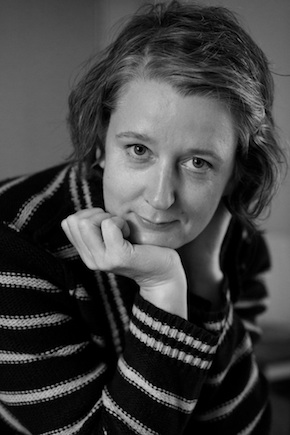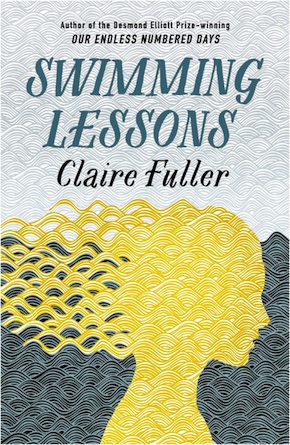Claire Fuller: A family at sea
by Juliet WestClaire Fuller’s second novel Swimming Lessons tells the story of a missing woman and her adult daughter who, twelve years on, tries to piece together the facts about her mother’s disappearance. She talks to Juliet West, author of Before the Fall, about the book’s genesis and her inspirations in nature.
JW: Swimming Lessons is such a rich and multilayered novel narrated in the voices of two women – Ingrid and her daughter Flora. Can you tell us a little about these two characters?
CF: Ingrid starts off as a young woman in the 1970s with big plans to discover life, get her university degree and travel the world, but she falls in love with her professor and becomes pregnant. For fifteen or so years she exists unhappily in her marriage and finds enforced motherhood difficult, until through a series of letters she discovers an alternative to the life she has been living. Flora is also a determined young woman, single-minded sometimes to the point of aggression. She has been living with her mother’s disappearance for more than half her life, and not knowing what happened to Ingrid has formed her character. She does soften, I think, at the end of the book.
I loved the way you handled the structural challenges of the two women’s different chronologies. Did you plan the structure from the start, or did it evolve over various drafts?
The structure of the book evolved during the first draft. My first drafts are usually quite complete; I edit a lot as I go along. But the very start of the story was from Ingrid’s husband Gil’s point of view. That wasn’t working so I changed it to Flora’s, and when I’d written a few thousand words, I decided that actually I wanted to hear Ingrid’s voice as well, so that’s when I started writing her letters.
When they marry, Ingrid moves to a coastal village called Spanish Green, where Gil has a ramshackle house that was once a swimming pavilion. Tell us a bit more about Spanish Green – is it based on a real place?
One of the things I loved writing in Our Endless Numbered Days was the forest setting. So I knew, with my second book, I also wanted a lot of nature in it, and decided to set it by the sea. Spanish Green is loosely based on a village in Dorset called Studland, an area I know well and visit very often – crossing on the ferry, and walking along the beaches and through the heathland. The swimming pavilion is also based on actual house in Studland which is an old tennis pavilion. The whole landscape there: beach, cliffs, heathland is dramatic and beautiful, and very inspirational.
Just like Ingrid and Flora, I love swimming in the sea. On a warm, calm day it seems like an easy thing to do, but there is always another world going on underneath.”
Ingrid and Flora share a love of swimming. Swimming in the sea offers freedom, yet there is always an undercurrent of menace. What inspired you to write about the sea?
Just like Ingrid and Flora, I love swimming in the sea. On a warm, calm day it seems like an easy thing to do, but there is always another world going on underneath, something you don’t see unless you go looking for it. And it can be a place of danger – currents and jellyfish, underwater rocks. A nice metaphor I thought for Ingrid’s life, and Flora’s search for her mother.
Definitely – that sense of danger really came through. Returning to Flora, I was interested in her unusual sense of smell; she perceives smells as colours, for example the smell of musty sheets is visualised as “the underside of mushrooms”. This must have been fascinating to write. Can you tell us how you developed this aspect of Flora’s character?
Flora has a form of synesthesia. I thought this would be very interesting for an artist – Flora is at art school. I’m in a writing group, and I think it was one of my fellow members who pointed out in a very early submission to the group that I’d described a smell as a colour, so I decided to go with it. It was fascinating to write, but also quite difficult. I would often go and actually find the smell if I could, and try to visualise what colour it made me think of, making sure I wasn’t literal about it. For example, if she smelled bananas, the colour wasn’t allowed to be yellow.
Flora is a hoarder while her sister, Nan, is practical and tidy. It’s very poignant the way Flora collects items as talismans – Annie’s teeth, a plastic whale’s head, a toy soldier. Little details like these are really powerful. How do you collect them as a writer?
I suppose it’s partly about the books I like to read. I like novels which stop now and again to focus on the details, the minutiae of life. And I also like characters who we see doing slightly odd things. We all do slightly odd things, I’m sure of it – or is that only me! The way we eat an egg, the objects we have around us for security or comfort, even the way we sit in a chair. Those characteristics can be very telling when you’re trying to create a fictional person.
Once Ingrid falls pregnant, she marries and abandons all professional ambition. It’s an experience she struggles with profoundly. Gil stifles her and even steals her ideas for his own work. This is the late 1970s/80s, but do you think this kind of marriage could exist today?
I set the period when we first meet Ingrid in the 1970s deliberately to show that despite the women’s liberation movement, for many ordinary women it made no difference to the challenges they faced in terms of bringing up children, career choices and expectations from husbands, and indeed themselves. And I’m certain a form of this marriage can and does exist today. It might be that the woman works outside of the home, but most usually this job is secondary to the husband’s and the majority of childcare still falls on her shoulders.
We all have families and we all have secrets. Even with someone we love and know extremely closely, we can never be inside their head.”
There are so many themes to this novel – love, loss, betrayal, motherhood. Your debut, Our Endless Numbered Days, also explored family relationships. Why are families and their secrets such a potent backdrop in fiction?
I’m glad you picked up on all those themes, but for me the biggest is whether it is better to know the truth or to live with one’s imaginings. Ingrid doesn’t know all of the truth about Gil, and what she imagines could be worse than reality. Flora doesn’t know the truth about what happened to her mother, and has to live with not knowing. But you’re right, this is all still about families and secrets. Perhaps it’s potent because it’s universal. We all have families and we all have secrets. Even with someone we love and know extremely closely, we can never be inside their head.
What are the challenges of writing ‘unsympathetic’ characters such as Gil?
Hah! He is unsympathetic I know, but I still love him. Perhaps all authors love even their ‘baddies’. When I was going through edits of Swimming Lessons with my editor she would write on the manuscript, why does Gil have to be so horrible? Can’t he be just a little bit nicer? I didn’t find writing him too much of a challenge at all; it’s the sympathetic characters I find harder. Perhaps the challenge is whether the readers can bear him…
I agree. Nice people are boring to write! Final question: how long did it take you to write Swimming Lessons, and can you tell us what you’re working on next?
It probably took me a couple of years to write, but it’s hard to quantify because for the majority of that time I was still working in another job, and doing publicity for Our Endless Numbered Days. I’ve now finished the first draft of novel number three which I always planned to do before Swimming Lessons was published. What I haven’t done is worked out how to boil the plot down to a couple of lines. At the moment when I try to tell people what it’s about it takes ten minutes. So you might have to wait a bit longer to find out.
 Claire Fuller was born in Oxfordshire in 1967 and gained a degree in sculpture from Winchester School of Art. After a career in marketing she began writing fiction at the age of 40. She has an MA in Creative and Critical Writing from the University of Winchester and lives in Hampshire with her husband and two children. Her first novel, Our Endless Numbered Days, won the Desmond Elliott Prize. Swimming Lessons is published by Fig Tree in hardback and eBook. Read more
Claire Fuller was born in Oxfordshire in 1967 and gained a degree in sculpture from Winchester School of Art. After a career in marketing she began writing fiction at the age of 40. She has an MA in Creative and Critical Writing from the University of Winchester and lives in Hampshire with her husband and two children. Her first novel, Our Endless Numbered Days, won the Desmond Elliott Prize. Swimming Lessons is published by Fig Tree in hardback and eBook. Read more
clairefuller.co.uk
@ClaireFuller2
Author portrait © Adrian Harvey
Juliet West grew up in Worthing and studied History at Cambridge. She worked as a journalist before taking an MA in Creative Writing at Chichester University, where she graduated with distinction and won the Kate Betts Memorial Prize. Her first novel Before the Fall is published by Pan and her second, The Faithful, is forthcoming from Mantle.
Read more
julietwest.com
@JulietWest14


